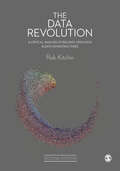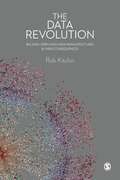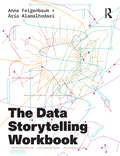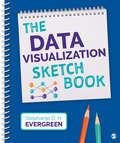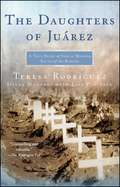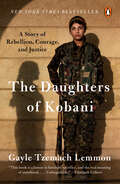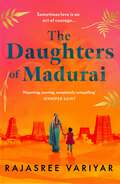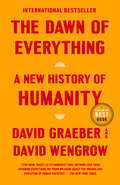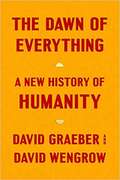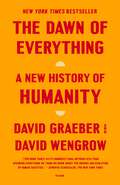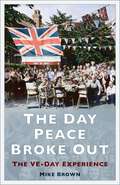- Table View
- List View
The Data Revolution: A Critical Analysis of Big Data, Open Data and Data Infrastructures
by Rob KitchinOur world is becoming ever more data-driven, transforming how business is conducted, governance enacted, and knowledge produced. Yet, the nature of data and the scope and implications of the changes taking place are not always clear. The Data Revolution is a must read for anyone interested in why data have become so important in the contemporary era. Thoroughly updated, including ten new chapters, the book provides an accessible and comprehensive: introduction to thinking conceptually about the nature of data and the field of critical data studies overview of big data, open data and data infrastructures analysis of the utility and value of big and open data for research, business, government and civil society assessment of the concerns and risks in a data-driven world and how to prevent and mitigate them.
The Data Revolution: Big Data, Open Data, Data Infrastructures and Their Consequences
by Rob Kitchin"Carefully distinguishing between big data and open data, and exploring various data infrastructures, Kitchin vividly illustrates how the data landscape is rapidly changing and calls for a revolution in how we think about data." - Evelyn Ruppert, Goldsmiths, University of London "Deconstructs the hype around the ‘data revolution’ to carefully guide us through the histories and the futures of ‘big data.’ The book skilfully engages with debates from across the humanities, social sciences, and sciences in order to produce a critical account of how data are enmeshed into enormous social, economic, and political changes that are taking place." - Mark Graham, University of Oxford Traditionally, data has been a scarce commodity which, given its value, has been either jealously guarded or expensively traded. In recent years, technological developments and political lobbying have turned this position on its head. Data now flow as a deep and wide torrent, are low in cost and supported by robust infrastructures, and are increasingly open and accessible. A data revolution is underway, one that is already reshaping how knowledge is produced, business conducted, and governance enacted, as well as raising many questions concerning surveillance, privacy, security, profiling, social sorting, and intellectual property rights. In contrast to the hype and hubris of much media and business coverage, The Data Revolution provides a synoptic and critical analysis of the emerging data landscape. Accessible in style, the book provides: A synoptic overview of big data, open data and data infrastructures An introduction to thinking conceptually about data, data infrastructures, data analytics and data markets Acritical discussion of the technical shortcomings and the social, political and ethical consequences of the data revolution An analysis of the implications of the data revolution to academic, business and government practices
The Data Revolution: Big Data, Open Data, Data Infrastructures and Their Consequences
by Rob Kitchin"Carefully distinguishing between big data and open data, and exploring various data infrastructures, Kitchin vividly illustrates how the data landscape is rapidly changing and calls for a revolution in how we think about data." - Evelyn Ruppert, Goldsmiths, University of London "Deconstructs the hype around the 'data revolution' to carefully guide us through the histories and the futures of 'big data.' The book skilfully engages with debates from across the humanities, social sciences, and sciences in order to produce a critical account of how data are enmeshed into enormous social, economic, and political changes that are taking place." - Mark Graham, University of Oxford Traditionally, data has been a scarce commodity which, given its value, has been either jealously guarded or expensively traded. In recent years, technological developments and political lobbying have turned this position on its head. Data now flow as a deep and wide torrent, are low in cost and supported by robust infrastructures, and are increasingly open and accessible. A data revolution is underway, one that is already reshaping how knowledge is produced, business conducted, and governance enacted, as well as raising many questions concerning surveillance, privacy, security, profiling, social sorting, and intellectual property rights. In contrast to the hype and hubris of much media and business coverage, The Data Revolution provides a synoptic and critical analysis of the emerging data landscape. Accessible in style, the book provides: A synoptic overview of big data, open data and data infrastructures An introduction to thinking conceptually about data, data infrastructures, data analytics and data markets Acritical discussion of the technical shortcomings and the social, political and ethical consequences of the data revolution An analysis of the implications of the data revolution to academic, business and government practices
The Data Storytelling Workbook
by Anna Feigenbaum Aria AlamalhodaeiFrom tracking down information to symbolising human experiences, this book is your guide to telling more effective, empathetic and evidence-based data stories. Drawing on cross-disciplinary research and first-hand accounts of projects ranging from public health to housing justice, The Data Storytelling Workbook introduces key concepts, challenges and problem-solving strategies in the emerging field of data storytelling. Filled with practical exercises and activities, the workbook offers interactive training materials that can be used for teaching and professional development. By approaching both ‘data’ and ‘storytelling’ in a broad sense, the book combines theory and practice around real-world data storytelling scenarios, offering critical reflection alongside practical and creative solutions to challenges in the data storytelling process, from tracking down hard to find information, to the ethics of visualising difficult subjects like death and human rights.
The Data Visualization Sketchbook
by Dr. Stephanie EvergreenThe Data Visualization Sketchbook, the latest addition to bestselling author Stephanie D.H. Evergreen’s arsenal of data viz tools, provides advice on getting started with sketching and offers tips, guidance, and completed sample sketches for a number of reporting formats including a project page, graphs, dashboards, a one-page handout, slide design, and a report structure. Dr. Evergreen shows how sketching gives people the space to think through not just an individual graphic, but how several graphics could fit together in a composition when creating drafts for infographics and dashboards. The book comprises six complete sets of report templates for you to sketch in and plan your own reporting, and it includes full color qualitative and quantitative "Chart Choosers”. This must-have sketchbook helps readers realize mistakes, find solutions quickly, and report data by methods that keep audiences engaged and informed.
The Data Visualization Sketchbook
by Dr. Stephanie EvergreenThe Data Visualization Sketchbook, the latest addition to bestselling author Stephanie D.H. Evergreen’s arsenal of data viz tools, provides advice on getting started with sketching and offers tips, guidance, and completed sample sketches for a number of reporting formats including a project page, graphs, dashboards, a one-page handout, slide design, and a report structure. Dr. Evergreen shows how sketching gives people the space to think through not just an individual graphic, but how several graphics could fit together in a composition when creating drafts for infographics and dashboards. The book comprises six complete sets of report templates for you to sketch in and plan your own reporting, and it includes full color qualitative and quantitative "Chart Choosers”. This must-have sketchbook helps readers realize mistakes, find solutions quickly, and report data by methods that keep audiences engaged and informed.
The Dating Divide: Race and Desire in the Era of Online Romance
by Jennifer Hickes Lundquist Celeste Vaughan Curington Ken-Hou LinThe data behind a distinct form of racism in online datingThe Dating Divide is the first comprehensive look at "digital-sexual racism," a distinct form of racism that is mediated and amplified through the impersonal and anonymous context of online dating. Drawing on large-scale behavioral data from a mainstream dating website, extensive archival research, and more than seventy-five in-depth interviews with daters of diverse racial backgrounds and sexual identities, Curington, Lundquist, and Lin illustrate how the seemingly open space of the internet interacts with the loss of social inhibition in cyberspace contexts, fostering openly expressed forms of sexual racism that are rarely exposed in face-to-face encounters. The Dating Divide is a fascinating look at how a contemporary conflux of individualization, consumerism, and the proliferation of digital technologies has given rise to a unique form of gendered racism in the era of swiping right—or left.The internet is often heralded as an equalizer, a seemingly level playing field, but the digital world also acts as an extension of and platform for the insidious prejudices and divisive impulses that affect social politics in the "real" world. Shedding light on how every click, swipe, or message can be linked to the history of racism and courtship in the United States, this compelling study uses data to show the racial biases at play in digital dating spaces.
The Daughters of George III: Sisters & Princesses
by Catherine CurzonAn in-depth look into the lives of the six daughters of King George III of England.In the dying years of the 18th century, the corridors of Windsor echoed to the footsteps of six princesses. They were Charlotte, Augusta, Elizabeth, Mary, Sophia, and Amelia, the daughters of King George III and Queen Charlotte of Mecklenburg-Strelitz. Though more than fifteen years divided the births of the eldest sister from the youngest, these princesses all shared a longing for escape. Faced with their father’s illness and their mother’s dominance, for all but one a life away from the seclusion of the royal household seemed like an unobtainable dream.The six daughters of George III were raised to be young ladies and each in her time was one of the most eligible women in the world. Tutored in the arts of royal womanhood, they were trained from infancy in the skills vital to a regal wife but as the king’s illness ravaged him, husbands and opportunities slipped away.Yet even in isolation, the lives of the princesses were filled with incident. From secret romances to dashing equerries, rumors of pregnancy, clandestine marriage and even a run-in with Napoleon, each princess was the leading lady in her own story, whether tragic or inspirational. In The Daughters of GeorgeIII, take a wander through the hallways of the royal palaces, where the king’s endless ravings echo deep into the night and his daughters strive to be recognized not just as princesses, but as women too.Praise for The Daughters of George III“This fascinating look at the lives and times of the six daughters of George III and Queen Charlotte delivers an engaging read for enthusiasts of the royals and British history.” —Library Journal
The Daughters of George III: Sisters & Princesses
by Catherine CurzonAn in-depth look into the lives of the six daughters of King George III of England.In the dying years of the 18th century, the corridors of Windsor echoed to the footsteps of six princesses. They were Charlotte, Augusta, Elizabeth, Mary, Sophia, and Amelia, the daughters of King George III and Queen Charlotte of Mecklenburg-Strelitz. Though more than fifteen years divided the births of the eldest sister from the youngest, these princesses all shared a longing for escape. Faced with their father’s illness and their mother’s dominance, for all but one a life away from the seclusion of the royal household seemed like an unobtainable dream.The six daughters of George III were raised to be young ladies and each in her time was one of the most eligible women in the world. Tutored in the arts of royal womanhood, they were trained from infancy in the skills vital to a regal wife but as the king’s illness ravaged him, husbands and opportunities slipped away.Yet even in isolation, the lives of the princesses were filled with incident. From secret romances to dashing equerries, rumors of pregnancy, clandestine marriage and even a run-in with Napoleon, each princess was the leading lady in her own story, whether tragic or inspirational. In The Daughters of GeorgeIII, take a wander through the hallways of the royal palaces, where the king’s endless ravings echo deep into the night and his daughters strive to be recognized not just as princesses, but as women too.Praise for The Daughters of George III“This fascinating look at the lives and times of the six daughters of George III and Queen Charlotte delivers an engaging read for enthusiasts of the royals and British history.” —Library Journal
The Daughters of Juarez
by Lisa Pulitzer Teresa Rodriguez Diana MontanDespite the fact that Juarez is a Mexican border city just across the Rio Grande from El Paso, Texas, most Americans are unaware that for more than twelve years this city has been the center of an epidemic of horrific crimes against women and girls, consisting of kidnappings, rape, mutilation, and murder, with most of the victims conforming to a specific profile: young, slender, and poor, fueling the premise that the murders are not random. Indeed, there has been much speculation that the killer or killers are American citizens. While some leading members of the American media have reported on the situation, prompting the U.S. government to send in top criminal profilers from the FBI, little real information about this international atrocity has emerged. According to Amnesty International, as of 2006 more than 400 bodies have been recovered, with hundreds still missing. As for who is behind the murders themselves, the answer remains unknown, although many have argued that the killings have become a sort of blood sport, due to the lawlessness of the city itself. Among the theories being considered are illegal trafficking in human organs, ritualistic satanic sacrifices, copycat killers, and a conspiracy between members of the powerful Juárez drug cartel and some corrupt Mexican officials who have turned a blind eye to the felonies, all the while lining their pockets with money drenched in blood. Despite numerous arrests over the last ten years, the murders continue to occur, with the killers growing bolder, dumping bodies in the city itself rather than on the outskirts of town, as was initially the case, indicating a possible growing and most alarming alliance of silence and cover-up by Mexican politicians. The Daughters of Juárez promises to be the first eye-opening, authoritative nonfiction work of its kind to examine the brutal killings and draw attention to these atrocities on the border. The end result will shock readers and become required reading on the subject for years to come.
The Daughters of Kobani: A Story of Rebellion, Courage, and Justice
by Gayle Tzemach LemmonThe extraordinary story of the women who took on the Islamic State and won <P><P>In 2014, northeastern Syria might have been the last place you would expect to find a revolution centered on women's rights. But that year, an all-female militia faced off against ISIS in a little town few had ever heard of: Kobani. By then, the Islamic State had swept across vast swaths of the country, taking town after town and spreading terror as the civil war burned all around it. From that unlikely showdown in Kobani emerged a fighting force that would wage war against ISIS across northern Syria alongside the United States. In the process, these women would spread their own political vision, determined to make women's equality a reality by fighting--house by house, street by street, city by city--the men who bought and sold women. <P><P>Based on years of on-the-ground reporting, The Daughters of Kobani is the unforgettable story of the women of the Kurdish militia that improbably became part of the world's best hope for stopping ISIS in Syria. Drawing from hundreds of hours of interviews, bestselling author Gayle Tzemach Lemmon introduces us to the women fighting on the front lines, determined to not only extinguish the terror of ISIS but also prove that women could lead in war and must enjoy equal rights come the peace. In helping to cement the territorial defeat of ISIS, whose savagery toward women astounded the world, these women played a central role in neutralizing the threat the group posed worldwide. In the process they earned the respect--and significant military support--of U.S. Special Operations Forces.Rigorously reported and powerfully told, The Daughters of Kobani shines a light on a group of women intent on not only defeating the Islamic State on the battlefield but also changing women's lives in their corner of the Middle East and beyond. <p><p><b>A New York Times Bestseller</b>
The Daughters of Madurai: Heartwrenching yet ultimately uplifting, this incredible debut will make you think
by Rajasree Variyar'Oh my goodness. If I could give this book 6 stars out of 5 I would' ⭐⭐⭐⭐⭐'One of those books that will stay with me for years and decades to come...' ⭐⭐⭐⭐⭐'Grabbed my heart and wouldn't let go!' ⭐⭐⭐⭐⭐'A joy to read' ⭐⭐⭐⭐⭐_____________________________________________________________A temple city in lush southern India, Madurai is bustling with pilgrims and steeped in history and tradition. Yet not all traditions should be upheld...1992. As a low-caste cleaner for a wealthy family, Janani's duty has always been quiet obedience. Even at home, her mother-in-law's word is law. Janani has never dared to dream of a different life. But now, she has something she'll do anything to protect... even if it means losing everything she's ever known.2019. Nila doesn't remember her life before they moved to Australia, and her parents never talk about their past. So when she joins her parents on a trip to their hometown, Madurai, she hopes she'll finally uncover the truth. Especially as Nila seeks acceptance for a secret of her own...For both Janani and Nila, love isn't simple.Sometimes love is an act of courage..._____________________________________________________________COSMOPOLITAN AND GLAMOUR'S BEST BOOKS OF 2023Apple's Best of the Month for May'Haunting, moving, completely compelling - an incredible debut' JENNIFER SAINT'A captivating and riveting debut from an unforgettable new voice' LOUISE O'NEILL'Heartrending but ultimately hopeful, this richly evocative and spellbinding book will touch your soul' VERONICA HENRY'A beautiful story, hauntingly written' JULIE COHEN'Heartbreaking, emotional and thought-provoking... I will think about this story for a long time' ALIYA ALI-AFZAL'Full of grace and tenderness' JYOTI PATEL'A haunting, powerful novel' THRITY UMRIGAR'Powerful and important' KAREN ANGELICO'A truly powerful story that remains with you long after the final word has been read' GLAMOUR'This raw and moving debut packs a punch' ADELE PARKS FOR PLATINUM'Utterly devastating and quietly hopeful' WOMAN'S OWN'Once read it is not easily forgotten' DAILY MAIL'You won't be able to put this compelling novel down' SUNDAY EXPRESS
The Dawn of Day
by Friedrich Nietzsche J. M. KennedyOne of the most important philosophers of the nineteenth century, Friedrich Nietzsche's influence on modern thought has extended beyond the borders of philosophy. His works have helped shape modern anthropology, psychology, theology, and sociology. Poets, novelists, and artists have also been touched by Nietzsche's powerful concepts and perspectives.Edited by a noted Nietzsche scholar, this authoritative compendium is a vital assembly of nearly all of Nietzsche's early works. Marking the advent of his mature philosophy, these aphorisms and prose poems examine the impulses that lead human beings to seek the comforts of religion, morality, metaphysics, and art. Nietzsche proposes greater individualism and personality development, addresses issues of society and family, and discusses visions of free spirits with the courage to be rid of idealist prejudices. Written in his distinctive, often paradoxical style, The Dawn of Day presents practically every theme touched upon in Nietzsche's later philosophical essays. It is an essential guide and a fundamental basis for the understanding of the great philosopher and his work.
The Dawn of Everything: A New History of Humanity
by David Graeber David WengrowRenowned activist and public intellectual David Graeber teams up with professor of comparative archaeology David Wengrow to deliver a trailblazing account of human history, challenging our most fundamental assumptions about social evolution--from the development of agriculture and cities to the emergence of "the state," political violence, and social inequality--and revealing new possibilities for human emancipation. <P><P>For generations, our remote ancestors have been cast as primitive and childlike--either free and equal innocents, or thuggish and warlike. Civilization, we are told, could only be achieved by sacrificing those original freedoms, or alternatively, by taming our baser instincts. Graeber and Wengrow show how such theories first emerged in the eighteenth century as a conservative reaction to powerful critiques of European society posed by Indigenous observers and intellectuals. Revisiting this encounter has startling implications for how we make sense of human history today, including the origins of farming, property, cities, democracy, slavery, and civilization itself. <P><P>Drawing on path-breaking research in archaeology and anthropology, the authors show how history becomes a far more interesting place once we learn to throw off our conceptual shackles and perceive what's really there. If humans did not spend 95% of their evolutionary past in tiny bands of hunter-gatherers, what were they doing all that time? If agriculture, and cities, did not mean a plunge into hierarchy and domination, then what kinds of social and economic organization did they lead to? What was really happening during the periods that we usually describe as the emergence of "the state"? The answers are often unexpected, and suggest that the course of human history may be less set in stone, and more full of playful, hopeful possibilities, than we tend to assume. <P><P>The Dawn of Everything fundamentally transforms our understanding of the human past and offers a path toward imagining new forms of freedom, new ways of organizing society. This is a monumental book of formidable intellectual range, animated by curiosity, moral vision, and a faith in the power of direct action.
The Dawn of Everything: A New History of Humanity
by David Graeber David WengrowA dramatically new understanding of human history, challenging our most fundamental assumptions about social evolution―from the development of agriculture and cities to the origins of the state, democracy, and inequality―and revealing new possibilities for human emancipation. <P><P> For generations, our remote ancestors have been cast as primitive and childlike―either free and equal innocents, or thuggish and warlike. Civilization, we are told, could be achieved only by sacrificing those original freedoms or, alternatively, by taming our baser instincts. David Graeber and David Wengrow show how such theories first emerged in the eighteenth century as a conservative reaction to powerful critiques of European society posed by Indigenous observers and intellectuals. Revisiting this encounter has startling implications for how we make sense of human history today, including the origins of farming, property, cities, democracy, slavery, and civilization itself. <P><P> Drawing on pathbreaking research in archaeology and anthropology, the authors show how history becomes a far more interesting place once we learn to throw off our conceptual shackles and perceive what’s really there. If humans did not spend 95 percent of their evolutionary past in tiny bands of hunter-gatherers, what were they doing all that time? If agriculture, and cities, did not mean a plunge into hierarchy and domination, then what kinds of social and economic organization did they lead to? The answers are often unexpected, and suggest that the course of human history may be less set in stone, and more full of playful, hopeful possibilities, than we tend to assume. <P><P> The Dawn of Everything fundamentally transforms our understanding of the human past and offers a path toward imagining new forms of freedom, new ways of organizing society. This is a monumental book of formidable intellectual range, animated by curiosity, moral vision, and a faith in the power of direct action. Includes Black-and-White Illustrations
The Dawn of Everything: A New History of Humanity
by David Graeber David WengrowRenowned activist and public intellectual David Graeber teams up with professor of comparative archaeology David Wengrow to deliver a trailblazing account of human history, challenging our most fundamental assumptions about social evolution--from the development of agriculture and cities to the emergence of "the state," political violence, and social inequality--and revealing new possibilities for human emancipation. <p><p>For generations, our remote ancestors have been cast as primitive and childlike--either free and equal innocents, or thuggish and warlike. Civilization, we are told, could only be achieved by sacrificing those original freedoms, or alternatively, by taming our baser instincts. Graeber and Wengrow show how such theories first emerged in the eighteenth century as a conservative reaction to powerful critiques of European society posed by Indigenous observers and intellectuals. Revisiting this encounter has startling implications for how we make sense of human history today, including the origins of farming, property, cities, democracy, slavery, and civilization itself. <p><p> Drawing on path-breaking research in archaeology and anthropology, the authors show how history becomes a far more interesting place once we learn to throw off our conceptual shackles and perceive what's really there. If humans did not spend 95% of their evolutionary past in tiny bands of hunter-gatherers, what were they doing all that time? If agriculture, and cities, did not mean a plunge into hierarchy and domination, then what kinds of social and economic organization did they lead to? What was really happening during the periods that we usually describe as the emergence of "the state"? The answers are often unexpected, and suggest that the course of human history may be less set in stone, and more full of playful, hopeful possibilities, than we tend to assume. <p><p> The Dawn of Everything fundamentally transforms our understanding of the human past and offers a path toward imagining new forms of freedom, new ways of organizing society. This is a monumental book of formidable intellectual range, animated by curiosity, moral vision, and a faith in the power of direct action. <p> <b>New York Times Bestseller</b>
The Dawn of Industrial Agriculture in Iowa: Anthropology, Literature, and History
by E. Paul DurrenbergerIn The Dawn of Industrial Agriculture in Iowa E. Paul Durrenberger recounts the transformation of Iowa’s family farms into today’s agricultural industry through the lens of the lives and writings of Iowa novelist Paul Corey and poet Ruth Lechlitner. This anthropological biography analyzes Corey’s fiction, Lechlitner’s poetry, and their professional and personal correspondence to offer a new perspective on an era (1925–1947) that saw the collapse and remaking of capitalism in the United States, the rise of communism in the Soviet Union, the rise and defeat of fascism around the world, and the creation of a continuous warfare state in America. Durrenberger tells the story that Corey aimed to record and preserve of the industrialization of Iowa’s agriculture and the death of its family farms. He analyzes Corey’s regionalist focus on Iowa farming and regionalism’s contemporaneous association in Europe with rising fascism. He explores Corey’s adoption of naturalism, evident in his resistance to heroes and villains, to plot structure and resolution, and to moral judgment, as well as his ethnographic tendency to focus on groups rather than individuals. An unusual and wide-ranging study, The Dawn of Industrial Agriculture in Iowa offers important insight into the relationships among fiction, individual lives, and anthropological practice, as well as into a pivotal period in American history.
The Day Freedom Died: The Colfax Massacre, the Supreme Court, and the Betrayal of Reconstruction
by Charles Lane"Absorbing ... Riveting ... A legal thriller. "--Kevin Boyle, The New York Times Book Review. Following the Civil War, Colfax, Louisiana, was a town like many where African Americans and whites mingled uneasily. On April 13, 1873, a small army of white ex-Confederate soldiers, enraged after attempts by freedmen to assert their new rights, killed more than sixty African Americans who had occupied a courthouse. Seeking justice for the slain, one brave U. S. attorney, James Beckwith, risked his life and career to investigate and punish the perpetrators--but they all went free. What followed was a series of courtroom dramas that culminated at the Supreme Court, where the justices' verdict compromised the victories of the Civil War and left Southern blacks at the mercy of violent whites for generations. The Day Freedom Died is a riveting historical saga that captures a gallery of characters from presidents to townspeople, and re-creates the bloody days of Reconstruction, when the often brutal struggle for equality moved from the battlefield into communities across the nation.
The Day I Die: The Untold Story of Assisted Dying in America
by Anita HannigAn intimate investigation of assisted dying in America and what it means to determine the end of our lives.In this groundbreaking book, award-winning cultural anthropologist Anita Hannig brings us into the lives of ordinary Americans who go to extraordinary lengths to set the terms of their own death. Faced with a terminal diagnosis and unbearable suffering, they decide to seek medical assistance in dying—a legal option now available to one in five Americans.Drawing on five years of research on the frontlines of assisted dying, Hannig unearths the uniquely personal narratives masked by a polarized national debate. Among them are Ken, an irreverent ninety-year-old blues musician who invites his family to his death, dons his best clothes, and goes out singing; Derianna, a retired nurse and midwife who treks through Oregon and Washington to guide dying patients across life's threshold; and Bruce, a scrappy activist with Parkinson's disease who fights to expand access to the law, not knowing he would soon, in an unexpected twist of fate, become eligible himself.Lyrical and lucid, sensitive but never sentimental, The Day I Die tackles one of the most urgent social issues of our time: how to restore dignity and meaning to the dying process in the age of high-tech medicine. Meticulously researched and compassionately rendered, the book exposes the tight legal restrictions, frustrating barriers to access, and corrosive cultural stigma that can undermine someone's quest for an assisted death—and why they persist in achieving the departure they desire.The Day I Die will transform the way we think about agency and closure in the face of death. Its colorful characters remind us what we all stand to gain when we confront the hard—and yet ultimately liberating—truth of our mortality.
The Day It Finally Happens: Alien Contact, Dinosaur Parks, Immortal Humans - And Other Possible Phenomena
by Mike Pearl__________If you live on planet Earth, you're probably scared about the future.Terrorism, complicated international relations, global warming, killer viruses and a raft of other issues make it hard not to be.Watching the news you have to wonder: is it safe to go out there or not?In The Day It Finally Happens, Mike Pearl games out many of the 'could it really happen?' scenarios we've all speculated about, assigning a probability rating, and taking us through how it would unfold. He explores what would likely occur in dozens of possible scenarios - the final failure of antibiotics, the loss of the world's marine life, the abolition of the British monarchy, and even the arrival of aliens - and reports back from the future, providing a clear picture on how the world would look, feel, and even smell in each of these instances.Hilarious, enlightening, and terrifying, this book makes science accessible and is a unique form of existential therapy, offering practical answers to some of our most worrisome questions.Thankfully, the odds of humanity pulling through look pretty good.__________For fans of such bestsellers as What If?,The Worst Case Scenario Survival Handbook and The Uninhabitable Earth, as well as Steven Pinker and Malcolm Gladwell, this is a book about future events that we don't really understand and getting to know them in close detail.Entertaining speculation featuring both authoritative research and a bit of mischief: a look at how humanity is likely to weather such happenings as the day nuclear war occurs, the day the global internet goes down, the day we run out of effective antibiotics, and the day immortality is achieved.
The Day It Finally Happens: Alien Contact, Dinosaur Parks, Immortal Humans - And Other Possible Phenomena
by Mike Pearl__________If you live on planet Earth, you're probably scared about the future. Terrorism, complicated international relations, global warming, and a raft of other issues make it hard not to be. Watching the news you have to wonder: is it safe to go out there or not? In The Day It Finally Happens, Mike Pearl games out many of the 'could it really happen?' scenarios we've all speculated about, assigning a probability rating, and taking us through how it would unfold. He explores what would likely occur in dozens of possible scenarios - the final failure of antibiotics, the loss of the world's marine life, the abolition of the British monarchy, and even the arrival of aliens - and reports back from the future, providing a clear picture on how the world would look, feel, and even smell in each of these instances. Hilarious, enlightening, and terrifying, this book makes science accessible and is a unique form of existential therapy, offering practical answers to some of our most worrisome questions. Thankfully, the odds of humanity pulling through look pretty good. __________For fans of such bestsellers as What If?,The Worst Case Scenario Survival Handbook and The Uninhabitable Earth, as well as Steven Pinker and Malcolm Gladwell, this is a book about future events that we don't really understand and getting to know them in close detail. Entertaining speculation featuring both authoritative research and a bit of mischief: a look at how humanity is likely to weather such happenings as the day nuclear war occurs, the day the global internet goes down, the day we run out of effective antibiotics, and the day immortality is achieved.(P) 2019 Simon & Schuster Audio
The Day It Finally Happens: Alien Contact, Dinosaur Parks, Immortal Humans—and Other Possible Phenomena
by Mike PearlFrom a Vice magazine columnist whose beat is “the future,” here is entertaining speculation featuring both authoritative research and a bit of mischief: a look at how humanity is likely to weather such happenings as the day nuclear war occurs, the day the global internet goes down, the day we run out of effective antibiotics, and the day immortality is achieved.If you live on planet Earth you’re probably scared of the future. How could you not be? Some of the world’s most stable democracies are looking pretty shaky. Technology is invading personal relationships and taking over jobs. Relations among the three superpowers—the US, China, and Russia—are growing more complicated and dangerous. A person watching the news has to wonder: is it safe to go out there or not? Taking inspiration from his virally popular Vice column “How Scared Should I Be?,” Mike Pearl in The Day It Finally Happens games out many of the “could it really happen?” scenarios we’ve all speculated about, assigning a probability rating, and taking us through how it would unfold. He explores what would likely occur in dozens of possible scenarios—among them the final failure of antibiotics, the loss of the world’s marine life, a complete ban on guns in the US, and even the arrival of aliens—and reports back from the future, providing a clear picture of how the world would look, feel, and even smell in each of these instances. For fans of such bestsellers as What If? and The Worst Case Scenario Survival Handbook, The Day It Finally Happens is about taking future events that we don’t really understand and getting to know them in close detail. Pearl makes science accessible and is a unique form of existential therapy, offering practical answers to some of our most worrisome questions. Thankfully, the odds of humanity’s pulling through look pretty good.
The Day Jesse James Was Killed
by Carl W. BreihanJesse James is Dead!On April 3, 1882, a bullet fired by Bob Ford from a Smith & Wesson .44 revolver ended the life of Jesse James, notorious badman. Since then, the James story has grown into a full-blown American legend.Here is the dramatic, day-by-day account of the gunman’s lawless adventures—which to some held the bravura of a Robin Hood and to others were wanton banditry—right up to the blood-curdling moment when Jesse is shot down dead in his own parlor.Now, for the first time, new material—drawn from authentic letters, old newspapers, and the personal remembrances of the James family, neighbors, and friends—casts a fascinating light on the motives and deeds of the entire James gang.
The Day Nina Simone Stopped Singing
by Mohamed Kacimi Darina Al-JoundiThe Homeland actress&’s &“recollections of her unconventional youth in war-torn Beirut are heartbreaking yet humorous . . . in this unique&” memoir (Publishers Weekly). Raised in 1970s Lebanon on Charles Baudelaire, A Clockwork Orange, and fine Bordeaux, Darina Al-Joundi was encouraged by her unconventional father to defy all taboos. She spent her adolescence defying death in Beirut nightclubs as bombs fell across the city. The more oppressive the country became, the more drugs and anonymous sex she had, fueling the resentment directed at her daily by the same men who would spend the night with her. As the war dies down, she begins to incur the consequences of her lifestyle. On his deathbed, her father&’s last wish is for his favorite song, &“Sinnerman&” by Nina Simone, to be played at his funeral instead of the traditional suras of the Koran. When she does just that, the final act of defiance elicits a catastrophic response from her surviving family members. In this dramatic true story, Darina Al-Joundi is defiantly passionate about living her life as a liberated woman, even if it means leaving everyone and everything behind in this &“beautifully taut and relentlessly unemotional&” memoir (Kirkus).
The Day Peace Broke Out: The VE-Day Experience
by Mike BrownAt 3 p.m. on 8 May 1945, Prime Minister Winston Churchill made a long-awaited speech in which he officially declared the war in Europe to be over. After six bitter years of conflict, however, perceptions of how victory over Nazism was to be celebrated and what post-war Britain should look like were very different from the visions of the people and the politicians in 1939. Illustrated with photographs, adverts, posters and cartoons, The Day the Peace Broke Out describes the VE-Day celebrations in Britain and across the world through the memories of those who were there, combined with contemporary newspaper and magazine articles. Mike Brown, an authority on the British Home Front of the Second World War, charts the nation's progressive change of heart from defeatism to growing confidence of certain victory. He looks at the immediate post-VE-Day period and the celebration of victory over Japan in August 1945. What should have been a story with a happy ending concludes with the harsh realisation of post-war austerity and the increasing disillusionment that led many Britons to conclude that they had won the war but lost the peace.
